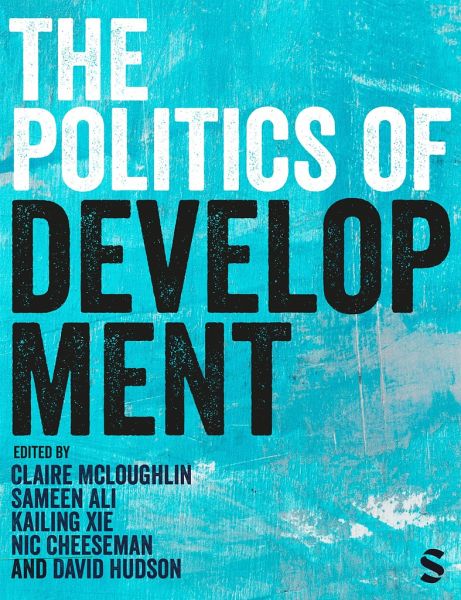Nicht lieferbar

Gebundenes Buch
The Politics of Development
Versandkostenfrei!
Nicht lieferbar




This text is a new introduction to the politics of development. Starting from the perspective of people's everyday experiences, it tackles some of the most pressing questions that underlie global inequality and injustice, from the ground up.
Claire is a political sociologist with more than 15 years' experience of researching, teaching, and advising international aid agencies on development. She is lead author and editor of The Politics of Development (SAGE, 2024). She was Director of Research for the Developmental Leadership Programme (2017-2022). Best known for her work on the politics of service delivery, its effects on state legitimacy, and the role of non-state actors in providing services, she has published in numerous journals, including World Development, Governance, Public Administration and Development, and Development in Practice. Sameen completed her PhD in Politics and International Studies from SOAS University of London in 2018. Her dissertation investigated relationships of patronage amongst politicians and bureaucrats in Pakistan as a means of targeting service delivery. Sameen is a member of the Education, Justice and Memory Network (EdJAM), an AHRC GCRF funded project investigating the teaching and learning of violent pasts in Pakistan, the UK, Cambodia, Colombia, and Uganda. She is Co-Director of the Women in Public Service in Pakistan Oral History Archive Project and a fellow at the Mahbub-ul-Haq Research Centre (MHRC), both based at the Lahore University of Management Sciences. Dr Kailing Xie joined IDD as lecturer in International Development in 2021. Before coming to Birmingham, she was a Teaching Fellow in Gender and International Development at the Department of Politics and International Development at the University of Warwick after completing her PhD in Centre for Women's Studies at the University of York in 2018. Dr Xie is also a Fellow in recognition of attainment against the UK Professional Standards Framework for teaching and learning support in higher education. Kailing takes a critical approach to International Development. Her work investigates the underlying social, cultural and political tensions underpinning China's economic success through the lens of gender. She aims to uncover real people's lived experience of different development projects against the backdrop of China's rise on the global stage. Her recent monography, Embodying middle class gender aspirations: perspectives from China's privileged young women, illuminates the centrality of heterosexual marriage as a primary institution in the organisation and reproduction of labour for the market economy, imbued with gendered inequality. Her article on 'Premarital Abortion' was awarded the 2017 Early Career Researcher Prize by the British Association of Chinese Studies. Nic Cheeseman (@fromagehomme) is Professor of Democracy at the University of Birmingham and was formerly the Director of the African Studies Centre at Oxford University. He mainly works on democracy, elections and development and has conducted in-country research in a range of African countries including Ethiopia, Ghana, Kenya, Malawi, Nigeria, Uganda, Zambia, and Zimbabwe, but has also published on Latin America and post-communist Europe. The articles that he has published based on this research have won a number of prizes including the GIGA award for the best article in Comparative Area Studies (2013) and the Frank Cass Award for the best article in Democratization (2015). Professor Cheeseman is also the author or editor of more than ten books, including Democracy in Africa (2015), Institutions and Democracy in Africa (2017), How to Rig an Election (2018), and Coalitional Presidentialism in Comparative Perspective (2018), Authoritarian Africa (2020), The Moral Economy of Elections in Africa (2020) and the Handbook of Kenyan Politics (2020). In addition, he is the founding editor of the Oxford Encyclopaedia of African Politics, a former editor of the journal African Affairs, and an advisor to, and writer for, the African Progress Panel set up by Kofi Anan. As of 2017 he also serves on the board of Oxfam GB, and sits on the organization′s Programme Committee, which provides input and advice to the programmes and projects that Oxfam GB supports around the world. In recognition of this academic and public contribution, the Political Studies Association of the United Kingdom awarded him the prestigious Joni Lovenduski Prize for outstanding professional achievement by a midcareer scholar in 2019. The same year, he was a finalist in the ESRC's prestigious Celebrating Impact prize. A frequent commentator of African and global events, Professor Cheeseman is a regular guest on CNN′s new flagship global affairs show One World, while his analysis has appeared in the Economist, Le Monde, Financial Times, Newsweek, the Washington Post, New York Times, BBC, and the Daily Nation, as well as his regular columns for the Mail & Guardian and The Africa Report. In total, his articles have been read over two million times. Many of his interviews and insights can be found on the website that he founded and co-edits, www.democracyinafrica.org. Most recently, Professor Cheeseman was part of the team that launched the Resistance Bureau, a new webinar and discussion space that brings together speakers from across Africa to discuss how democracy and freedom can best be strengthened and defended. Check out https: //www.theresistancebureau.com/ for more details and past episodes. In the academic year 2021/2022, Professor Cheeseman will be on academic leave after being awarded a British Academy Fellowship for a new research project on the history and impact of African political thought. David is currently the PI and Co-I on 2 large research projects: (1) the Developmental Leadership Program (funded by the Australian Aid Program) with Dr Claire Mcloughlin and Professor Chris Roche, (2) the Development Engagement Lab (formerly the Aid Attitudes Tracker (Bill & Melinda Gates Foundation) with Professor Jennifer vanHeerde-Hudson (UCL). He is also part of the IOM-DFID funded project MIGCHOICE looking at migrant decision-making in West Africa with Dr Cassilde Schwartz and Dr Miranda Simon, and previously part of the Migrant Networks, Decisions, and Immigration Policy (Leverhulme Trust), alongside Professor Shane Johnson and Dr Cassilde Schwartz and Dr Miranda Simon. David joined the University of Birmingham in March 2017 after nearly 12 years at UCL, in the Department of Political Science. Prior to joining UCL he was an ESRC Postdoctoral Fellow in the Department of Political Science and International Studies at the University of Birmingham (2004-05). In 2013 David was a British Academy Mid-Career Fellow working on the project 'Public Engagement with Global Poverty'. In 2016 he was a Visiting Research Fellow, Institute for Human Security and Social Change, La Trobe University, and a Visiting Fellow, Development Policy Centre, Crawford School of Public Policy, Australian National University. David has also taught at the Universities of Birmingham, Nottingham, and SOAS.
Produktdetails
- Verlag: Sage Publications
- Seitenzahl: 392
- Erscheinungstermin: 15. Mai 2024
- Englisch
- Gewicht: 942g
- ISBN-13: 9781529667707
- ISBN-10: 1529667704
- Artikelnr.: 69567154
Herstellerkennzeichnung
Libri GmbH
Europaallee 1
36244 Bad Hersfeld
gpsr@libri.de
Für dieses Produkt wurde noch keine Bewertung abgegeben. Wir würden uns sehr freuen, wenn du die erste Bewertung schreibst!
Eine Bewertung schreiben
Eine Bewertung schreiben
Andere Kunden interessierten sich für




